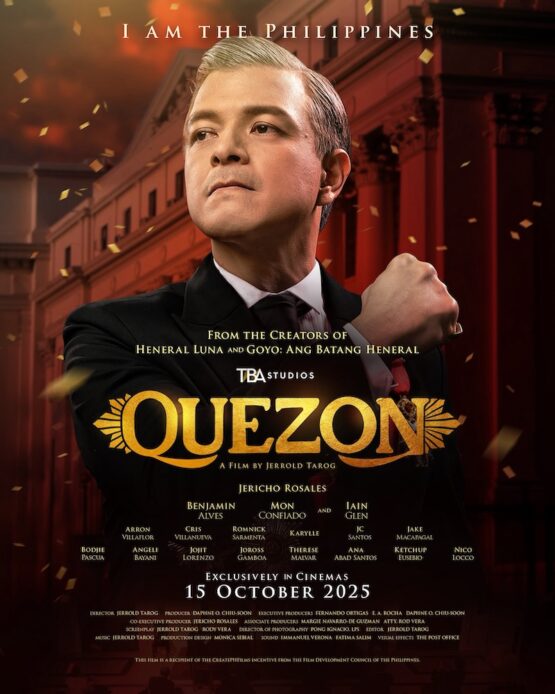Several weeks into its cinema run, Jerrold Tarog’s Quezon has become difficult to separate from the discourse that surrounds it. The film was certainly always meant to start a conversation using Manuel L. Quezon’s rise to the Philippine presidency in 1935—but for some, the more important discussion is whether or not the movie portrays the late Commonwealth president fairly in the first place. Interrogating any artist’s interpretation of history is healthy, of course, provided it’s done in good faith and with the humility to interrogate one’s own political biases and proximity to power as well.
The question of Quezon’s morality is obviously central to this film, but what enriches Tarog’s work is that Quezon becomes a gateway into much larger ideas. Through its peculiar story structure, a deceptively charismatic lead performance, and deliberately didactic writing (for better or worse), the movie becomes just as much about the present moment of our watching it.
This third installment in Tarog’s Bayaniverse trilogy of historical dramas (following 2015’s Heneral Luna and 2018’s Goyo: Ang Batang Heneral) departs from the series’ stately tone and blockbuster scale, but remains effective entertainment of a different kind.
Quezon is a vibrantly designed film that may come off more like a diorama or an artificially colorized photograph, rather than a lived-in representation of history. However, at its best, the tidiness of the production design feels wholly appropriate for its perception of politics as a circus, where alliances are only sleight of hand, and crucial deals toward Philippine independence must swing from one person’s ego to the next. Even Jericho Rosales’ portrayal of the titular president leans into showmanship—flamboyance and charisma that one can’t help but be drawn to, before revealing a chilling remorselessness behind closed doors.
It’s Tarog’s work as editor that truly gives it its identity
There’s an absurdity and an irreverence to the movie that gives it much of its unexpected humor, but it’s Tarog’s work as editor that truly gives it its identity. As we’re shuttled around the timeline between Quezon’s career as a young lawyer and his days of unrestrained ambition as senate president, the film divides its story according to the different enemies he must either silence or tempt over to his side. It feels less like a traditional narrative and more like we’re examining various arguments—cohering into a particular line of thinking about Filipino patronage politics as a whole. It’s a refreshing way of bringing this trilogy fully into the realm of the postmodern.
Before long, it becomes clear that Tarog’s aims with Quezon move beyond the man himself. The more that the movie returns to clips of silent propaganda films (rendered in remarkably authentic make-up and Pong Ignacio’s black-and-white cinematography)—and the more that Cris Villanueva’s journalist character, Joven, directly comments on the events being depicted—the more that these heavy-handed devices compel us to think of Tarog’s work as self-referential. The characters spell it out for us: Cinema can transform reality into something more hopeful and digestible, but filmmakers also have a responsibility to be truthful and critical, especially with regard to those who already hold great influence.
Simply put, Quezon isn’t just about Quezon, but about how we talk about Quezon. We are constantly made aware that his story is being perceived and interpreted by the figures around him—that this is a narrative that knows it’s a narrative, scrutinizing its own individual pieces. Quezon himself becomes a puzzle of an idea that demands careful untangling, not blind acceptance. The film’s focus on his morally flexible strategies (rather than his achievements) feels like a conscious effort on Tarog’s part to ensure that these movies never get misinterpreted as hero worship or as endorsements of authoritarian leaders.
However, it can’t help but feel like a missed opportunity that Tarog stops short of really grappling with how art in this country is often co-opted by politicians or made complicit in political mythmaking, which his Luna allegedly fed into before Rodrigo Duterte’s election as president.
By rejecting the look and feel of a traditional biographical film, Quezon asks that we reexamine how we think of our politicians. Instead of defining them solely by their greatest achievements or what they’re like as “normal people” in their private lives, the movie asks us which and how many contradictions we’re willing to accept in our leaders. The question lands with more urgency when we hear Rosales’ Quezon emphasize his pragmatic belief that the ends justify the means—a sentiment we regularly hear from our elected officials and from people debating each other on the internet.
Granted, the film doesn’t always go about things elegantly. Its didactic script at times over-explains itself to the point that it seems to actively distrust the audience. And too often do characters learn new information through other people walking into the scene just to hand them a letter or a newspaper. But for all of its clunky narrative devices, the movie still offers a confident, passionate perspective. It doesn’t offer the most cogent argument that Quezon’s rise created a domino effect into our politics today. However, it’s much more concerned about how our attitude towards a person like Quezon can be easily twisted into tolerance and forgiveness toward those currently causing us harm today.
Quezon is showing in cinemas.
Related story:
The Bodyguard: Whitney Houston hits barely strung by a story





